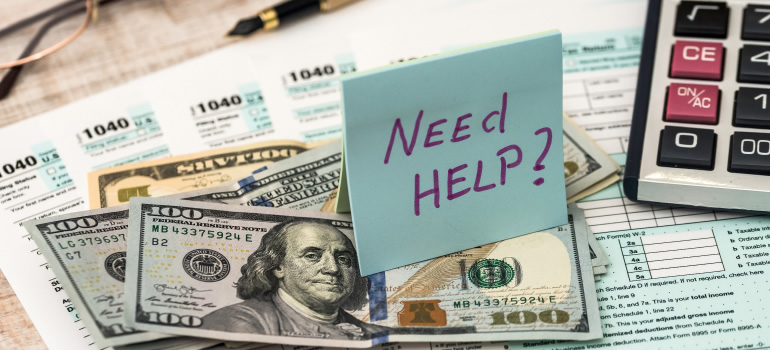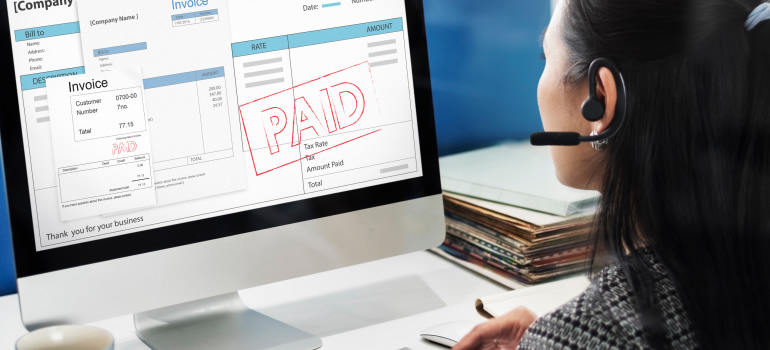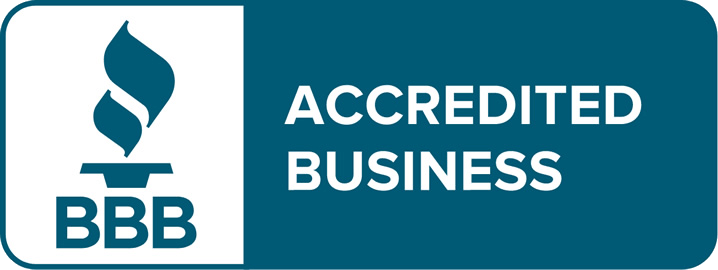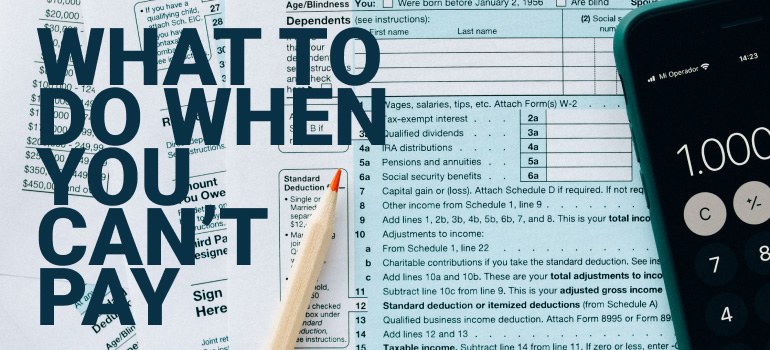When you owe taxes to the internal revenue service your first thought may be that you can’t pay. You see the number, you know how much money is in your account, and it doesn’t add up. You can’t cover it and pay your bills. If you’re like most people you feel a heavy weight from the uncertainty of what’s ahead.
The most important thing to keep in mind is that you’re not the first person to owe the IRS, nor will you be the last. Thousands have come before you and found a way to pay and move on with life, and many more thousands will come after.
There are a lot and common reasons a person might owe taxes to the IRS.
Maybe you claimed too many exemptions over the years or under taxes withheld income through your employer. Self-employed individuals and small business owners can get behind on estimated payments and come up short when the final tax date arrives.
Sometimes life happens and you fall into financial hardships. You get in an accident, you lose your job, a loved one gets sick. Instead of paying the IRS tax bill you take care of your family and end up owing taxes you can’t pay.
Tax debts aren’t only problems for individuals. Often, businesses get behind on their tax liability and owe money they can’t pay. Whether an individual or business owes taxes they almost always have options to pay that they never considered.
In this article, we’re going to discuss all the angles with owing the IRS taxes. You’ll learn what your options are, and ways you can pay off taxes you owe to the IRS so you can remove the added weight of unpaid taxes and get back to life as it should be.
In this comprehensive tax levy guide the following questions will be answered:
What to do if You Owe the IRS

When you have an unpaid tax balance, the first thing you need to evaluate is how much of your tax bill you can pay now. If you’re in a position to pay what you owe on your tax return in full amount, the best choice is usually to pay your debt and be done with it.
However, paying what you owe on your tax return is not always an option. When you can’t pay your tax bill in full you must understand all of your options and choose the one that works best for your unique situation. You can pursue this on your own if you have the time, or for guaranteed best results hire a tax professional that can represent your best interest and find the most affordable resolution.
The best resolution may come in the form of an installment agreement or an offer in compromise. There may even be past deductions from past tax returns you didn’t take advantage of that can help reduce your federal and state taxes.
What Happens if you Owe the IRS and Don’t File?

When you owe the IRS and don’t file, eventually they will create a substitute for return based on the taxable income that was reported to them. This income is reported through your W2 or your 1099s. A 1099 miscellaneous is for the income you receive when working as an independent contractor. A 1099 B would come from your brokerage firm after you sell stocks. Basically, any type of income that’s reported to the internal revenue service will be considered.
To make this situation worse, the internal revenue service will not take into account any type of expenses you might have had related to work. They’re just going to create the highest possible return and tax balance.
Some people fly under the radar for a while because they know that there aren’t any wages being reported to the IRS. The problem with this approach is the massive risk that comes with a potential IRS audit.
If nothing is being reported, the internal revenue service may take steps to audit you and request bank statements. They’ll take a close look at all of your finances, which is a very intense process. This is stressful and often results in a substantially higher tax balance.
If you don’t pay your taxes, eventually the IRS will likely file a federal tax lien and begin an enforcement process that can involve the levy of funds from your account and seizure of assets.
The best course of action is to report your earnings as accurately as possible and pay taxes. If you get behind on your tax bill, let the internal revenue service know, and work with them to get current.
What Happens If You Owe More Taxes than You Can Pay?

When you owe more taxes than you can pay you first must understand the severity of your tax burden. Generally, the severity is categorized into those that owe $50,000 or less, and those that owe over $50,000.
For example, say you file your return as a self-employed person and now you owe $20,000 but you can’t pay it because you only have $11,000 in your account. It feels really bad at the time, but you can pay this down with an installment agreement. You pay as much as you can to limit penalties and then choose a payment plan that you can stick to.
Let’s say you’re reading this and you owe more than $50,000. In this case, you’ll still want to establish a resolution. You can do this on your own, or hire tax professionals to represent you. Your individual situation will determine if an installment agreement or offer in compromise is best. Whatever the best path is, you want to actively work toward a resolution to avoid a tax levy.
Options To Help You Pay Your Taxes

If you owe taxes, your choice is to pay or not pay them. If you decide to pay, which is always the best choice, you must decide how you will pay. Generally, you’ll have three options: pay in full, set up an installment agreement with monthly payments, or settle the debt with an offer in compromise.
If you already looked into options to help you pay your income taxes you may have come across what we consider not to be helpful tax advice. For example, paying your tax debt with a credit card is not a great solution.
The first thing to consider is how you got to where you are now. If you’re a self-employed individual for example that didn’t set aside enough to pay your quarterly estimated taxes then you’ll want to be prepared for that next tax year. Whatever your situation, the only way to avoid it from happening again is with an honest evaluation.
Maybe you know what happened, but need help making a plan so it doesn’t happen again. If you are an employee and you owe taxes this year rather than getting a big refund or a smaller refund, you might consider talking to your employer. You can ask them to adjust your income tax withholding so that a little more is taken out each month. A slight increase in your tax withholding shouldn’t affect your monthly cash flow too much.
When you work with a tax professional they can help you identify different forms of income that should and should not be taxed. One example can be a cancellation of debt. If you have a credit card and that debt is forgiven because the lender decides to charge off the debt, you no longer owe it. Maybe you reached a settlement for example. They’ll send you a document that cancels that debt. If you’re insolvent at the time, you can file a certain tax form along with your tax return to state insolvency and avoid paying any taxes on that income.
Another good example is when you run your own small business and do a poor job at expensing business-related items from your income to reduce your taxable income. If you’re not keeping proper records there are solutions in place to go back and historically account for everything.
Get a free consultation
We Are Committed To Finding SolutionsLearn MoreFAQs About Owing Taxes
 Can you go to jail for not paying your taxes?
Can you go to jail for not paying your taxes?
There is no criminal statute that will give you any type of imprisonment for not paying your taxes.
When the news reports on celebrities going to jail for not paying their taxes, they are not going to jail for the act of not paying taxes. In most of these cases, individuals are found guilty of willful fraud. The criminal offense is fraud, which is not the same as not paying taxes.
 How much will the IRS usually settle for?
How much will the IRS usually settle for?
A common misconception is that settling with the IRS is a negotiation in the same way a business negotiates its debts and liabilities. What the IRS does is review taxpayer collectibility. They look at what a taxpayer has, and their ability to pay. If they deem that the debt you owe is not one you can fully repay, then they start to consider you for the settlement process.
When you become eligible for the settlement process, the IRS will review what you can reasonably repay. For example, if they’re looking at a taxpayer with a household of four or five living on one income of $45,000 that individual literally can’t pay anything. They’re struggling to get by each month. For that type of person, they can settle for a very low amount.
On the other hand, if they’re looking at a one-person household making $120,000 the settlement amount would be much higher. An individual like that probably has $30,000 to $40,000 worth of disposable income each tax year.
Other elements that come into play are age and potential earning power. If you’re 20 years old and the IRS thinks you’ll be earning more in four years, that’s a big factor. Likewise, if you’re 70 years old and you may not be able to work another tax year your income amount will not be as much of a deciding variable.
 Does the IRS forgive tax debt after 10 years?
Does the IRS forgive tax debt after 10 years?
It’s not so much that it’s forgiven, but 10 years marks the end of the collection statute enforcement period. After the collection statute ends, the IRS no longer pursues the debt. In unique circumstances, like in the case of fraud, they can renew their lien.
 What is the maximum the IRS can garnish?
What is the maximum the IRS can garnish?
The IRS can take no more than 25% of your disposable income or the amount of your income that exceeds 30 times the federal tax minimum wage, whichever is less.
 Can the IRS take money from my bank account without notice?
Can the IRS take money from my bank account without notice?
No, they can not. Notice is required, which is due process and your right under the United States Constitution. With that said, you may have received a notice and not realized it because you didn’t read your mail. Make sure to keep every piece of correspondence you receive from the IRS for your records.
 How long of a payment plan will the IRS accept?
How long of a payment plan will the IRS accept?
The longest payment plans are typically 84 months. However, when your financials represent an inability to fully pay the debt, you can get into a payment plan that lasts the full term of the collection statute enforcement date.
 Can I file my taxes even though I owe back taxes?
Can I file my taxes even though I owe back taxes?
Yes, and you have a requirement to do so. If you fail to file your taxes on time you’ll be faced with additional penalties and only increase what you already owe. Having an outstanding tax bill is not a reason to stop filing your current taxes, as it only makes your problems worse.
 What happens if you owe the IRS more than $50,000?
What happens if you owe the IRS more than $50,000?
The $10,000 mark is the first benchmark that should get your attention when it comes to owing taxes. When you owe more than $10,000 there’s a chance a tax lien will be filed against you.
The next big benchmark to take notice of used to be $50,000. That number has slightly changed, and will likely change again. Today, $54,000 is the threshold where the IRS can certify your tax debt as seriously delinquent.
When this happens, they’ll notify the state department and let them know you’re an individual with a seriously delinquent debt. This may prevent you from applying for, or renewing your passport.
If you’re thinking about traveling abroad with a serious tax debt of over $54,000 something could happen to your passport while traveling.
Other significance about the $50,000 mark is related to the streamlined installment agreement. Now if you owe between $50,001 to $100,000 you can qualify for a streamlined installment agreement for 84 months. If it’s under $50,001 you can qualify for a 72 month streamline agreement.
We Are Committed To Finding Solutions
Learn MoreTax Resolution Help

Now you have a better idea about your options, but navigating through them and choosing the best one is not so straightforward. Working with a tax resolution company can relieve you of the burden of figuring out the best path forward. An experienced tax relief company can review your tax situation, advise you about your best options for paying owed taxes and ensure the quickest path forward. They will help you:

Choose the Best Way to Pay
Tax professionals can help you navigate which option is best for your unique financial situation. Whether it be paying the full balance, setting up installment agreements, or pursuing an offer in compromise.

Make the Best Case
When the IRS requests personal information or financial statements to support your request your hired tax professional can make an accurate and convincing case for you. Your tax expert can also communicate with the IRS on your behalf, so you can focus on your day-to-day and not stress about your case.

Save as Much as Possible
Your tax resolution partner ensures you get the best outcome, which is the outcome that saves you the most money. Whether it’s hardship extension, penalty relief, or helping you to deduct expenses from past years that you failed to consider deduct on your federal tax returns.
20/20 Tax Resolution are nationwide tax pros when it comes to tax relief help. 20/20 Tax Resolution has helped over 32,000 businesses and individuals reach successful resolutions with their IRS and state tax liabilities.



